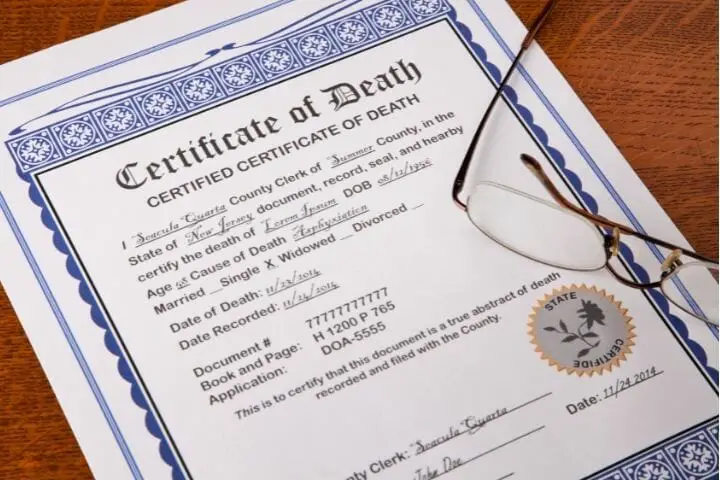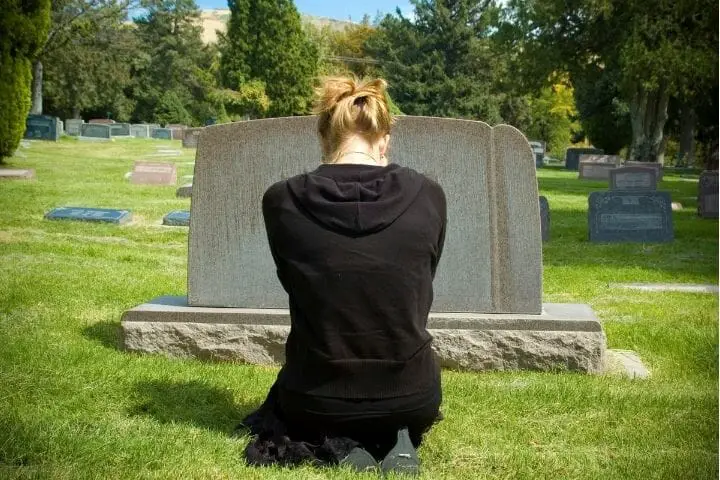Losing your husband is one of the hardest things to go through. There is the emotional ups and downs of settling into a new life where your partner and best friend is no longer with you.

After the dust settles, there are realities of life a widow has to settle into like paying the bills. Some partners will be reliant on both social security incomes to make sure that they can pay the bills, and their income is limited.
So, when a husband does is his wife entitled to his social security? Here’s what you need to know.
Contents
Social Security and a Surviving Partner
When a social security beneficiary passes away, their surviving partner is eligible for something called survivor benefits.
If the surviving partner has reached full retirement age then they are eligible to receive 100% of their late partner’s benefit amount. However there is a slight catch. If the deceased partner claimed any of the benefits before they reached retirement age then the amount the surviving partner gets will be lower.
To note, full retirement age is currently 66 years old but there are plans to increase it to 67 over the next few years.
Applying for Survivor Benefits
If you were already receiving spousal benefits from social security then it is likely you will be automatically switched over to survivor benefits when the death is appropriately reported.
If you were not receiving any spousal benefits from social security prior to your partner passing away then you will need to apply to receive survivor benefits. To do this, you will need to contact your local Social Security office, or by calling the Social Security Administration.

When you go to apply for survivor’s benefits there are certain documents you will need in order to ensure you get the benefits you need
- Proof of death (death certificate)
- Both your social security number and the social security number of the deceased person
- Your birth certificate
- If you are applying as a widow/widower, you will need your marriage certificate
- If you a divorced widow/widower (and neither one remarried) then you will need your divorce paperwork
- Any dependent children’s social security numbers
- The tax returns (or W-2s) of the deceased person
- Your bank account number and routing information (for direct deposit to your account for the benefit)
Do You Qualify for Survivor Benefits?
For the most part, widows/widowers will qualify for survivor benefits as long as they are at least 60 years old at the time their partner passed away and they had been married to the deceased partner for at least 9 months prior to their passing.
There are, of course, a few exceptions to this rule though
- If you have a disability, you can apply for survivor benefits as early as age 50 as long as the disability occurred within 7 years of your spouse’s death
- If you are providing care for children from the marriage who are under 16 years of age, or are disabled, then you can apply for survivor benefits at any age
- If the beneficiary’s death was accidental or happened in the line of U.S military duty then there is no requirement on the length of the marriage.
Another factor that may affect your eligibility for survivor’s benefits is whether you decide to remarry after your spouse passes away. If you remarried before you turned 60 (or 50 if you are disabled) then you cannot receive any of these survivor benefits. However you may be eligible to receive them again if that marriage dissolves.
Additionally, there is no effect on survivor benefits if you choose to remarry after you are 60 years old – you will continue to receive them as you were in this case.
How Much Will You Receive in a Survivor Benefit?
Your survivor benefit will be calculated based on the amount that your late spouse was receiving before they passed away. If they were not receiving any benefits yet (or had not withdrawn any of the benefits yet) then the calculation would be based on what they were entitled to receive based on age and earning history. Learn here the latest social security calculator.
Read More: How Much Savings Does It Take To Retire in the Philippines?
Some Other Items To Note About Survivor’s Benefit
The first thing to remember is that if you receive another pension or retirement benefit you may not receive survivor’s benefit. Social security will only pay the higher of the two amounts. So if you were planning on this additional money each month for helping with living expenses you may not get it.
If you and your partner divorced years ago, but neither one of you remarried than you may actually be able to qualify for your former partner’s social security benefit depending on their work record.

Another thing to keep in mind is that if you are still working, and haven’t reached full retirement age, then your survivor benefit could be affected by the limit of earnings set by Social Security.
Further, the surviving spouse did not have to work long enough – or at all – to qualify for their own social security to get survivor’s benefits. They can still, likely, collect the benefit from their decease spouse’s social security.
Paying the Bills After Your Spouse Dies
For couples who have been receiving two incomes – as in two social security benefits coming in – they may find themselves relying on that money to make sure they can pay the bills every month. By the way, we also wrote a guide on how to pay funereal with little to no money.. By the way, we also wrote a guide on how to pay funereal with little to no money..
When a spouse dies, the survivor benefit will only pay out one of the two benefits: either the social security OR the survivor’s benefits, whichever is higher.
For this reason, many widows/widowers find it very difficult to pay the bills when their spouse passes away. They may have to sell or downsize their homes, and some even are moving in with their adult children.
In some cases, depending on the age in which their spouse passed away, widows/widowers may even stay working for years longer than they would have wanted because they need that extra income to pay the bills.
Does Social Security Help With Paying Final Expenses?
In some ways, yes social security will help with paying the final expenses for your spouse. They will pay out a one time, lump-sum of $255.
The requirements for receiving this benefit are that the spouse must have lived with the deceased and it must be claimed within 2 years of the death. If there is no surviving spouse, then it can be paid out to a child.
Read More: Tax Planning for Seniors – All Your Questions Answered
How Long Does a Survivor Receive the Benefits For?
The surviving spouse’s benefits will be received for as long as the surviving spouse is alive.

If the widow/widower receives some additional benefits because there were minor dependents when the deceased person passed away then those additional benefits will cease when the dependent turns 18.
Other Financial Concerns
Once things have settled from the passing of your spouse, you may be unsure about what to do next in terms of finances. You want to make sure you are going to be able to survive and be able to afford your lifestyle, without too much compromising.
This may be a great time to sit down with a financial planner to make sure you have a plan in order and are going to be able to afford to live in the coming years.
When people retire, their income earning potential greatly declines so you don’t want to go to the bank one day and realize you don’t have any money left.
Talk to you financial planner or advisor, let them know what your goals are. You may want to downsize your home because you don’t want to live in a big house on your own, or without your spouse.
So you may have a large chunk of money coming into your account from the sale of your home too. No matter what your plans are, having a plan in place is the most important thing so that you know are financially secure.
In Summary
Losing your spouse is one of the hardest times anyone can go through. There are so many things to take care of and worry about when it comes to final arrangements and closing out accounts.
Worrying about money comes when the dust settles and reality starts to come into light. Right away, the surviving spouse may not be worried about how they’re going to pay the bills because they are ok right now but in a few years the money may not be there.
Making a financial plan would be a good idea so that you know you will be able to afford your lifestyle as the years go on. You may have additional assets you can leverage, or you may be able to move in with family to help reduce costs. Taking care of yourself is important during this time and that includes financially.
If you have questions about survivor’s benefits or how much you qualify for, you can always call the Social Security Administration to determine what’s available to you. They will be able to provide you with the dollar amounts unique to your case, and that way you’ll know exactly what you can depend on when the time comes.
